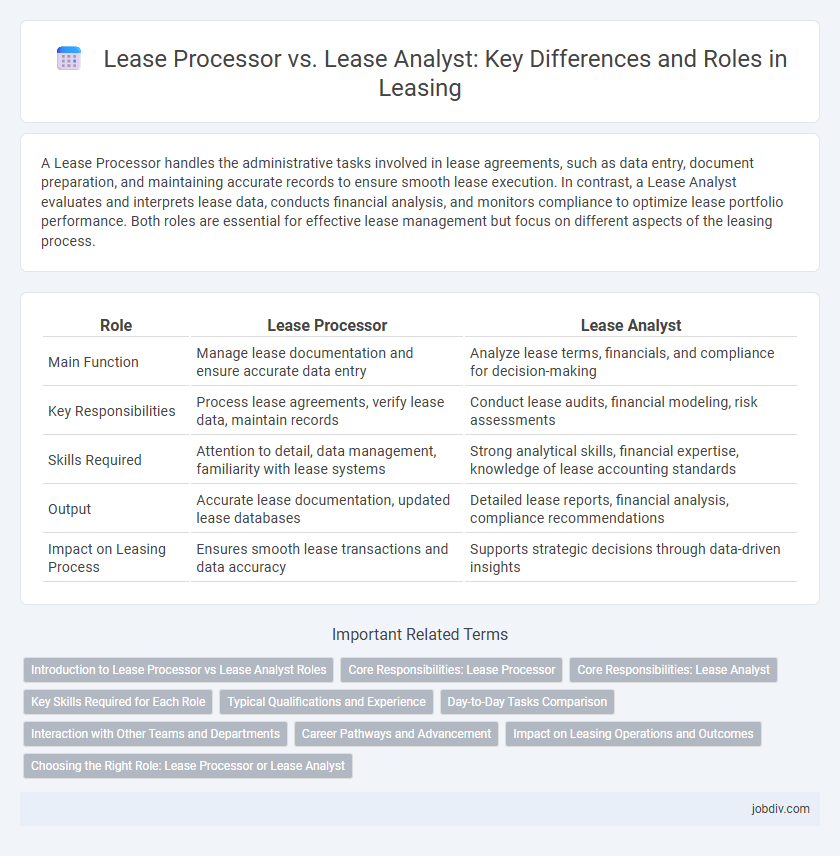A Lease Processor handles the administrative tasks involved in lease agreements, such as data entry, document preparation, and maintaining accurate records to ensure smooth lease execution. In contrast, a Lease Analyst evaluates and interprets lease data, conducts financial analysis, and monitors compliance to optimize lease portfolio performance. Both roles are essential for effective lease management but focus on different aspects of the leasing process.
Table of Comparison
| Role | Lease Processor | Lease Analyst |
|---|---|---|
| Main Function | Manage lease documentation and ensure accurate data entry | Analyze lease terms, financials, and compliance for decision-making |
| Key Responsibilities | Process lease agreements, verify lease data, maintain records | Conduct lease audits, financial modeling, risk assessments |
| Skills Required | Attention to detail, data management, familiarity with lease systems | Strong analytical skills, financial expertise, knowledge of lease accounting standards |
| Output | Accurate lease documentation, updated lease databases | Detailed lease reports, financial analysis, compliance recommendations |
| Impact on Leasing Process | Ensures smooth lease transactions and data accuracy | Supports strategic decisions through data-driven insights |
Introduction to Lease Processor vs Lease Analyst Roles
Lease Processors manage the administrative tasks involved in lease agreements, including document preparation, data entry, and coordination between parties to ensure accurate lease execution. Lease Analysts focus on interpreting and analyzing lease contracts, assessing financial implications, compliance with accounting standards like ASC 842 or IFRS 16, and providing strategic insights to optimize lease management. Both roles are critical in the leasing industry, with the Lease Processor emphasizing operational efficiency and the Lease Analyst prioritizing financial accuracy and regulatory adherence.
Core Responsibilities: Lease Processor
Lease Processors are responsible for preparing, reviewing, and managing lease documentation to ensure accuracy and compliance with company policies and legal regulations. They coordinate lease execution by communicating with tenants, lessors, and internal departments, facilitating smooth lease agreements and renewals. Lease Processors also maintain detailed lease records and monitor important dates such as lease commencements, expirations, and rent escalations to support effective lease administration.
Core Responsibilities: Lease Analyst
Lease Analysts focus on reviewing and interpreting lease agreements to ensure compliance with regulatory standards and company policies. They analyze financial data related to lease payments, obligations, and terms to provide accurate reporting and forecasting. Their core responsibilities include identifying lease risks, preparing detailed lease abstracts, and supporting decision-making processes through comprehensive lease data analysis.
Key Skills Required for Each Role
Lease Processors require strong attention to detail, proficiency in document management, and expertise in data entry to ensure accurate lease contract preparation and compliance. Lease Analysts need advanced analytical skills, financial modeling abilities, and a deep understanding of lease accounting standards such as ASC 842 or IFRS 16 to evaluate lease agreements and provide strategic insights. Both roles demand effective communication skills, but Lease Analysts rely heavily on critical thinking to interpret lease data and forecast impacts on financial statements.
Typical Qualifications and Experience
Lease Processors typically hold a certificate or associate degree in business or real estate and have 1-3 years of experience handling lease documentation, data entry, and administrative support. Lease Analysts often possess a bachelor's degree in finance, real estate, or a related field, combined with 3-5 years of experience in lease review, financial analysis, and compliance evaluation. Both roles require strong attention to detail and knowledge of lease agreements, but Lease Analysts focus more on interpreting lease terms and financial implications.
Day-to-Day Tasks Comparison
A Lease Processor handles the preparation, review, and execution of lease documents, ensuring all paperwork is accurate and compliant with company policies and regulations. A Lease Analyst focuses on evaluating lease agreements, analyzing financial data, and preparing reports to support decision-making and lease optimization. While Lease Processors manage administrative and operational tasks, Lease Analysts perform in-depth financial assessments and strategic lease evaluations.
Interaction with Other Teams and Departments
Lease Processors coordinate closely with leasing agents, property managers, and accounting departments to compile and verify lease documents, ensuring data accuracy and regulatory compliance. Lease Analysts collaborate with finance teams, legal departments, and market research units to interpret lease terms, analyze financial impacts, and support strategic lease decision-making. Both roles require strong interdepartmental communication but differ in focus: processors emphasize operational execution, while analysts concentrate on financial analysis and reporting.
Career Pathways and Advancement
Lease Processors handle critical documentation and data entry tasks, developing expertise in lease agreements and compliance regulations that provide a strong foundation for career advancement. Lease Analysts interpret lease financials, perform complex market analyses, and generate strategic reports, positioning them for progression into senior financial or portfolio management roles. Transitioning from Lease Processor to Lease Analyst enhances analytical skills and industry knowledge, creating broader career pathways in commercial real estate and asset management sectors.
Impact on Leasing Operations and Outcomes
Lease Processors streamline leasing operations by managing documentation, data entry, and ensuring compliance, which accelerates transaction times and reduces errors. Lease Analysts provide critical insights through financial modeling, market analysis, and risk assessment, enabling more informed decision-making and optimizing lease portfolio performance. Together, their combined expertise enhances efficiency, accuracy, and strategic outcomes in leasing operations.
Choosing the Right Role: Lease Processor or Lease Analyst
Choosing between a Lease Processor and Lease Analyst depends on whether the focus is on administrative accuracy or financial analysis. Lease Processors specialize in managing lease documentation, ensuring compliance, and maintaining accurate records throughout the lease lifecycle. Lease Analysts, on the other hand, delve into lease data interpretation, financial reporting, and strategic decision-making based on lease contract evaluations.
Lease Processor vs Lease Analyst Infographic

 jobdiv.com
jobdiv.com